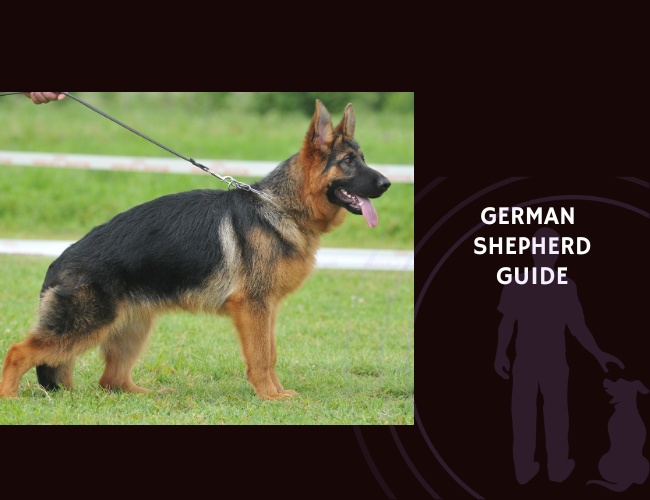Introduction to the German Shepherd
Origin and Historical Development
The German Shepherd is a breed with roots deeply embedded in working dog tradition. Developed in Germany toward the end of the nineteenth century, these dogs were originally bred to herd sheep and protect livestock, combining intelligence with a high level of trainability. Their agility and responsive nature made them excellent herding dogs. Over time, German Shepherds were recognized for more than just their work with sheep, evolving into versatile utility dogs trusted in various roles from police and military service to search and rescue operations.
Cognitive, Physical, and Emotional Complexity
German Shepherds are known for their remarkable intelligence and quick learning abilities. They excel at problem-solving and thrive in environments where they are given tasks to complete. Physically, they are strong, athletic, and agile, allowing for performance in activities ranging from scent work to obedience competitions. Emotionally, German Shepherds display a unique blend of sensitivity and confidence. They are closely attuned to their handlers and respond to human emotions, making them trusted companions for both work and family life.
Versatility as a Working Breed
One feature that stands out is the breed’s unmatched versatility. German Shepherds are valued in many settings, from service roles—like guide and assistance dogs—to demanding fields such as K9 units, protection work, and therapy. Their drive and loyalty ensure they excel across different jobs. Their adaptability, combined with a strong desire to work, means they succeed wherever clear expectations and supportive leadership are present.
With this foundation, understanding the breed’s qualities gives valuable insight for anyone considering a German Shepherd as a companion or working partner.
Character & Behavioral Profile
Loyalty, Awareness, and Protective Instincts
German Shepherds are famous for strong loyalty and a natural desire to form close bonds with their owners. This deep attachment gives them a remarkable ability to read people and situations, making them both trustworthy and responsive companions. Originally bred for herding and protection, their powerful sense of environmental awareness helps them react quickly to changes around them. This alertness, paired with their protective drive, forms the heart of their famous guarding reputation.
These dogs are not just reliable but also attentive to the emotions and intentions of those in their care. In family life, their loyalty often focuses on one or two main handlers, though they can be affectionate and gentle with everyone in the household.
Behavioral Tendencies and Social Interactions
German Shepherds show high alertness, often scanning their surroundings and picking up on unfamiliar people or odd sounds. These behaviors can make them appear cautious or suspicious when meeting strangers, which is a valuable trait for a watchdog. Their readiness to act is not just about aggression—it also means being prepared to protect or intervene if a threat is sensed.
However, without proper socialization and defined leadership, this suspicion can escalate into fear-based behaviors or anxiety. Consistent, positive routines help them stay balanced and confident.
Working-Line vs. Show-Line Differences
It is important to note the distinction between working-line and show-line German Shepherds. Working-line dogs tend to have higher energy, stronger drive, and increased resilience. These traits suit them for demanding jobs like search and rescue or police work. Show-line dogs, while still intelligent and trainable, are often bred more for appearance and may have a calmer demeanor and less intense drive.
Understanding the unique temperament and drive of each line supports better training and happier households. With the right environment and care, German Shepherds thrive and continue to impress with their character and adaptability.
Social Intelligence & Bonding
Unique bonds and emotional connection
One of the defining qualities of the German Shepherd is the way it forms deep bonds with one or two primary handlers. This loyalty is not just preference—it is woven into the breed’s social intelligence. German Shepherds naturally seek out a clear leader and can become very attached, showing affection and attentiveness. This tendency makes them ideal for working teams or families seeking a devoted companion.
Emotional sensitivity in family life
Emotional sensitivity is a key trait of the German Shepherd. These dogs often mirror the moods and energy levels of their family members. A German Shepherd quickly picks up on changes in tone and body language. While this makes them excellent at reading intentions and needs, it also means they may become anxious or withdrawn when there is tension at home. Calm, consistent interaction builds a positive foundation and helps these dogs feel secure.
Risks of poor socialization or inconstant handling
When socialization is lacking or owner expectations are inconsistent, behavioral issues can arise. German Shepherds who do not meet enough people or animals in early life may become nervous or reactive in new situations. Unclear boundaries or erratic handling can lead to fear, anxiety, or even fear-based aggression. For this breed, structured experiences and gentle exposure to new environments are vital in preventing reactivity and building confidence.
Through strong social connections and attentive care, the German Shepherd’s remarkable loyalty and emotional intelligence flourish, setting the stage for purposeful training and growth.

Training Approaches & Education
Structured Training for the German Shepherd
German Shepherds thrive in environments where training is clear, organized, and purposeful. This breed’s intelligence means they are quick learners, but they need a plan that challenges their mental abilities. Purpose-driven training with a focus on solving problems, such as nose work or advanced obedience, keeps them engaged. These dogs require structure in their routines, as inconsistent or chaotic approaches can lead to confusion or behavioral issues.
Clear Communication and Positive Reinforcement
Effective training for German Shepherds centers on clear and calm communication from the handler. Because they are sensitive to their owner’s tone and body language, ambiguity in commands or harsh corrections often leads to mistrust or even anxiety. Instead, reward-based reinforcement—using treats, toys, or praise—motivates positive behaviors and builds a strong dog-human bond. By marking desired behaviors with immediate rewards, you help your German Shepherd understand what is expected and encourage repeat success.
The Importance of Early Socialization
Proper socialization in puppyhood is essential to shape the German Shepherd’s reactions to new sights, sounds, people, and animals. Controlled exposure to varied environments and experiences reduces the risk of fear-based reactivity as the dog matures. Early socialization promotes a balanced temperament and helps build confidence, making the dog more adaptable to everyday situations. Continuing social experiences into adulthood supports behavioral neutrality and emotional stability, benefiting both dog and household.
Consistent, structured training and gentle, positive communication set a strong foundation for a happy, responsive German Shepherd, giving them the clarity and confidence they need to excel in any role.
Working Capabilities & Aptitudes
Natural Abilities and Task Focus
German Shepherds are widely respected for their impressive skills in different working roles. Their sharp noses make them top performers in scent work, from search and rescue to detection jobs. Obedience is a natural fit—they quickly learn commands and thrive on pleasing their handlers. In protection and utility work, their courage and sensitivity shine, making them valuable in police, military, and service environments.
Problem-Solving Skills
One of the most informative and distinctive strengths of the German Shepherd is problem-solving. These dogs are quick to notice patterns, solve challenges, and adapt. Their intelligence goes beyond just following orders; they can think independently. This professional trait makes them preferred partners for complex jobs that need quick thinking and fast actions.
Handler Focus and Structure
German Shepherds show strong commitment to their human partners. They work best with clear, regular communication and consistent expectations. Without a supportive framework, or when roles are unclear, they may develop behavioral issues such as restlessness or anxiety. Structured routines and specific jobs keep their minds engaged and behavior balanced. A lack of structure or unclear training can lead to mistrust or unwanted actions.
Why Clear Roles Matter
Defining a clear role for your German Shepherd is key. Whether it is scent work, protection, or being part of the family routine, role definition keeps them motivated and emotionally healthy. Structured, task-oriented environments tap into their true potential and reduce the risk of problem behaviors.
Helping your German Shepherd find their purpose creates a smoother, happier relationship, and brings out their best qualities every day.
Nutritional Requirements
Balanced nutrition for high performance
GSD are active, muscular dogs that demand the right balance of German Shepherds nutrient to thrive. Their caloric needs range from moderate to high, depending on age, activity level, and whether they have demanding working roles. Growing puppies, energetic adults, and working-line dogs require more calories, while senior and less active dogs need fewer.
Essential proteins and fats
Protein is crucial for lean muscle building and overall health. These dogs do best with diets that offer enough high-quality animal-based protein to support muscle strength and immune response. Alongside protein, moderate to high levels of fat provide energy for work and play. Healthy fats—including omega-3 fatty acids—help support cell health, coat condition, and proper brain function.
Joint-supportive nutrients
Orthopedic issues, such as hip and elbow dysplasia, are common in German Shepherds. To help manage this risk, joint-supportive nutrients like glucosamine, chondroitin, and omega-3s are often recommended. These nutrients can be naturally found in some commercial foods or added as supplements. Regular intake supports mobility and helps reduce inflammation in hardworking joints.
Supporting growth and digestion
During growth phases, it is important to control calorie and nutrient intake to prevent overly rapid growth that could stress developing joints. Some German Shepherds may have sensitive digestion, so foods that are easy to digest and moderate in fat levels are preferred.
Providing for these special nutritional requirements ensures your German Shepherd stays active, healthy, and ready for new adventures every day.
Loyal. Focused. Fierce.
Deep emotional loyalty defines the German Shepherd.
These dogs don’t just follow—they bond, watching your every move and tuning in to your tone like a second language. Behind their stoic gaze lies a heart fiercely committed to their people, a trait that makes them irreplaceable as companions, protectors, and working partners. This loyalty is not learned—it’s instinct.
A sharp mind demands meaningful engagement.
German Shepherds are thinkers. They don’t do well with idle repetition or empty praise. They want purpose. They want structure. Give them a role, a challenge, a job—and they’ll meet you with focus, precision, and pride. Neglect their mind, and you risk frustration turning into fixation or reactivity.



Sensitivity isn’t weakness. It’s wisdom.
Despite their commanding presence, German Shepherds are emotionally perceptive dogs. They read tension in a room, feel shifts in your mood, and respond to energy faster than you can speak it. Handled with calm, respectful leadership, they rise to their full potential—balanced, intuitive, and fiercely devoted.
Feeding Protocols & Considerations
Managing Growth in Puppies
Caring for a German Shepherd puppy requires attention to their growth rate. It is crucial to avoid rapid weight gain during their early months, as their bones and joints are still developing. Overfeeding, especially with high-calorie foods, can increase the risk of hip and elbow dysplasia—common concerns in this breed. Feeding your puppy balanced portions, split into three meals per day, helps control their calorie intake. Choose puppy-specific foods designed for large breeds, which support steady growth and contain nutrients that aid bone and joint health.
Addressing Digestive Sensitivities
German Shepherds are prone to digestive issues, so food selection must be handled thoughtfully. Diets with moderate fat levels and high digestibility are best. Look for dog foods that feature easily-digested proteins like chicken or lamb. Limit ingredients that may cause allergies or upset, such as soy or artificial additives. If loose stools or flatulence become frequent, transitioning to a sensitive stomach formula may help. Feeding at regular intervals and using the same diet consistently can also support digestive comfort.
Adapting Nutrition Through Life Stages
Nutritional needs change as your dog grows. Puppies require higher protein and calorie levels, while adults need maintenance levels based on activity. For highly active or working dogs, increased calories and protein are important for energy and muscle repair. Seniors benefit from diets with joint-supportive nutrients, like glucosamine and omega-3 fatty acids, to help manage age-related joint concerns. Always adjust portions in response to your dog’s current weight, age, and activity level to prevent obesity and maintain optimal health.
Careful feeding practices not only support physical development but also contribute to a happy, healthy German Shepherd.
Common Health Concerns
Hip and Elbow Dysplasia
German Shepherds are at high risk for hip and elbow dysplasia, both of which are inherited orthopedic conditions. They cause pain and reduced mobility as the dog ages. Responsible breeders use established screening protocols such as those from OFA (Orthopedic Foundation for Animals) and FCI (Fédération Cynologique Internationale) to reduce the risk of passing on these problems. Early detection and weight management can help minimize discomfort over a dog’s lifetime.
Degenerative Myelopathy and Other Genetic Risks
Degenerative myelopathy is a progressive disease that affects the spinal cord, leading to weakness and eventual paralysis in the hind legs. While there is no cure, maintaining a healthy lifestyle and regular veterinary checkups offer supportive care. Alongside this, German Shepherds may develop exocrine pancreatic insufficiency (EPI), which impacts digestion, or chronic ear infections—often due to allergies or moisture-trapping ear shapes.
Gastric Dilatation-Volvulus (Bloat)
Due to their deep-chested anatomy, German Shepherds face a significant risk of bloat, also known as gastric dilatation-volvulus (GDV). This condition involves the stomach filling with gas and potentially twisting, which is a critical emergency. Owners should feed meals in smaller portions, avoid strenuous activity immediately after eating, and consult their veterinarian about ways to reduce bloat risk.
Understanding these health challenges is key to providing a supportive and informed routine for your German Shepherd.

Preventative Healthcare
Essential Screenings and Vet Practices
For German Shepherds, proactive healthcare starts with routine screening. Orthopedic issues like hip and elbow dysplasia are very common in this breed. Screening through OFA (Orthopedic Foundation for Animals) or FCI (Fédération Cynologique Internationale) protocols is highly recommended. These exams help identify problems early, supporting better mobility as your dog ages. Annual vet checkups are also key for monitoring overall health, catching issues such as degenerative myelopathy or exocrine pancreatic insufficiency (EPI) before they worsen. Routine ear checks and cleanings reduce the risk of chronic ear infections, a frequent concern for German Shepherds.
Lifespan and Longevity Factors
A healthy German Shepherd can live between nine and thirteen years. Longevity is influenced by a mix of genetics, consistent exercise, stable weight, and prompt preventive care. Keeping your dog at a lean weight, providing structured daily activity, and following a vaccination schedule all help maintain good health over the years. Nutrition also matters—balanced meals promote joint health and support the immune system.
Managing Allergies and Breed-Specific Issues
Some German Shepherds struggle with allergies and specific conditions like anal furunculosis or pannus (chronic superficial keratitis). Common symptoms may include itchy skin or eye irritation. Consult your vet for medication and diet options tailored to your dog’s needs. Early intervention helps control these issues and improves your dog’s quality of life.
By keeping up with these proactive care strategies, you help your German Shepherd enjoy a longer, healthier, and happier life.
Exercise & Mental Stimulation Needs
Daily Activity Requirements
To keep a German Shepherd healthy and happy, they need at least 90 minutes of structured exercise every day. This can include brisk walks, jogging, playing fetch, and agility training. Without enough activity, they may become restless or show unwanted behaviors. A large, secure outdoor area gives them room to burn energy and move freely.
Importance of Mental Stimulation
Physical activity alone is not enough for this intelligent breed. Mental stimulation is just as important. Interactive games, puzzle toys, and obedience training give their sharp minds a workout. Scent work, learning new tricks, and problem-solving tasks are fantastic options. Regular sessions with their handler create a positive bond and ensure the dog feels engaged and valued.
Bonding Through Interactive Work
German Shepherds form strong connections with their handlers through teamwork. Tasks like agility courses, hide-and-seek, and obedience routines build trust and communication. These shared experiences help the dog understand expectations and thrive emotionally.
Consequences of Isolation or Under-stimulation
If a German Shepherd is not given enough mental or physical activity, they may develop behavior problems such as barking, chewing, digging, or anxiety. Long periods alone can also lead to withdrawal or even depression. Owners must commit time and energy every day to keep their dog mentally sharp and emotionally balanced.
Proper exercise and stimulation set the foundation for lifelong health and satisfaction in this remarkable breed.
Ideal Living Environment
The Right Setting for German Shepherds
German Shepherds thrive best in homes that offer consistent engagement, purpose, and structure. They excel in environments where they can participate in working, performance, or high-engagement roles. Whether it is herding, search and rescue, or advanced obedience, these dogs flourish when they have meaningful tasks to accomplish every day. Being part of a family that appreciates their intelligence and provides daily outlets for their energy keeps them balanced and fulfilled.
Secure Space and Routine Benefits
A secure outdoor space is vital for this breed. German Shepherds benefit from having a safe area to run, explore, and play. Access to a yard allows them to release energy positively and maintain their physical health. Just as important as space, however, is routine. Stable daily schedules help reduce anxiety and ensure emotional balance. Consistency in walks, feeding times, and social interaction helps them feel secure and focused.
Challenges in Low-Structure Homes
These intelligent dogs do not do well with long hours alone or inconsistent routines. In households lacking structure, German Shepherds may develop behavioral problems such as excessive barking, destructive chewing, or anxiety. Their need for clear boundaries and expectations cannot be understated. Prolonged isolation often leads to frustration and stress, both of which can negatively impact their wellbeing.
Creating an environment tailored to their working heritage allows German Shepherds to show their true potential and maintain a strong, healthy bond with their human companions.
Maintaining Emotional Balance
Calm Leadership and Consistent Expectations
German Shepherds thrive when they feel safe and know what is expected. Calm leadership provides a stable foundation. When owners show steady confidence, these dogs understand that their world is predictable. Consistent social expectations—such as clear routines for feeding, exercise, and training—help reduce stress. This breed is emotionally sensitive, so unpredictable environments or harsh corrections can erode trust and cause anxiety. Instead, gentle corrections and patient guidance foster mutual respect and trust.
The Power of Mental Outlets
This intelligent breed needs more than just physical activity. Variety in mental outlets is key to a content German Shepherd. Interactive games, nose work, and obedience challenges stimulate their minds. Puzzle toys or scent work provide problem-solving opportunities, which prevents boredom and frustration. A dog that is mentally busy is less likely to develop destructive habits such as chewing or excessive barking.
Fostering Relational Consistency
Relational consistency helps German Shepherds feel secure. Building trust through regular, positive interactions makes them confident family members. Keep training sessions upbeat, encourage calm responses, and reward good behavior. Over time, strong bonds will develop, supporting emotional balance even in new or stressful situations.
A balanced German Shepherd is a happy companion—calm yet alert, active but not hyper, and always attuned to the emotional tone of the home. This foundation sets the stage for a well-rounded and harmonious relationship.
Conclusion: Is a German Shepherd Right for You?
Choosing to welcome a German Shepherd into your life is a significant commitment. This breed demands much more than basic care—they need structure, purpose, and ongoing engagement to thrive. Their intelligence and sensitivity mean they quickly respond to your energy and routines. Owners must be ready to give consistency, calm leadership, and plenty of daily interaction.
Lifestyle Compatibility
German Shepherds are best suited for individuals and families who can dedicate time to exercise, structured play, and mental activities. They do not do well when left alone for long hours or kept in low-structure households. Instead, they flourish in homes that offer:
- Regular routines
- Secure outdoor spaces
- Task-oriented roles or jobs
- Consistent, supportive social expectations
Their need for daily physical and mental challenges is non-negotiable. Neglecting these aspects can result in frustrated or anxious behaviors.
The Rewards
When their needs are met, German Shepherds return your investment in remarkable ways. They offer steadfast loyalty, alertness, and a strong desire to please. Their deep bonds with their family and handlers can be a joy, bringing emotional richness to your life. With the right environment and guidance, they become happy, balanced, and trustworthy companions who thrive on partnership and teamwork.
Understanding what it takes to raise a German Shepherd will help you decide if your household and lifestyle are a perfect match for this extraordinary breed.










